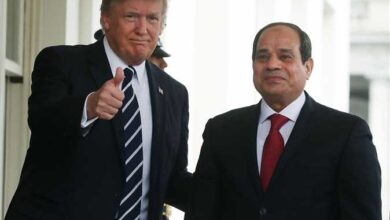Obama administration officials reported on Tuesday during a hearing of the US House Committee on Foreign Relations that business with Egypt cannot continue as usual, and thus have set forth what they called a “recalibrated” aid package.
Though many members of the House and the witnesses argued over specific points, one theme was echoed by all speakers: despite its setbacks on the democratic roadmap, Egypt is a vital US ally and the relationship should not be allowed to sour.
The committee heard remarks from three US government officials who served as witnesses to the hearing: Assistant Secretary Elizabeth Jones of the Bureau of Near East Affairs from the US State Department, Assistant Secretary Derek Chollet for International Security Affairs at the US Department of Defense and Deputy Assistant Administrator Alina Romanowski of the Bureau for the Middle East at USAID.
The witnesses, all serving for various departments under the Obama administration, agreed on a similar narrative: the US government has recalibrated assistance to Egypt to stand firm in disapproval over events that transpired following the ouster of former President Mohamed Morsy.
The officials were referring to a series of actions by the interim Egyptian government that demonstrated they had backtracked on their commitment to a democratic roadmap. The main concern was the excessive force used in the sit-in dispersals of Rabaa al-Adaweya and Nadha Squares, leading to the mass killing of over 500 Muslim Brotherhood protesters, which Human Rights Watch called the “most serious incident of mass unlawful killings in modern Egyptian history.”
Another point of friction with the Egyptian government was the crackdown on foreign rights and democracy groups, in what Jones called a “politically motivated trial.” In a rush of xenophobia earlier this year, the government convicted 43 non-profit workers, 16 of them American citizens, of illegally using foreign funds to “foment unrest” in Egypt. The trial conveniently fit into the Egyptian political establishment’s common narrative of protecting against Western conspiracies to destroy Egypt.
Other issues of contention were the extension of emergency law, arrest of opposition figures, and restrictions on press and civil society.
The witnesses expressed the Obama administration’s view that while Morsy was elected freely and fairly, he did not govern inclusively and alienated the public. The 30 June revolution, they argued, was Egyptians expressing they had taken a “wrong turn” and wanted to reboot their democracy.
The aid recalibration, Jones stressed, has allowed the continuation of crucial US aid operations, such as support for securing Sinai, curbing weapons smuggling and US educational military training. Rather it has merely suspended the purchase of the big-ticket, flashy weapons that go to Egypt’s military generals.
Chollet clarified that aid for sustainment for Egypt’s existing weapons is continuing, but the suspension applies to buying new weapons that do not align with Egypt’s democratic roadmap, such as F-16s, Apache helicopters, M1-A1 tank kits and harpoon missiles. Chollet added that these weapons could actually hinder the progress to a democratic government.
Romanowski said despite the changes to the aid, USAID has been able to maintain projects that directly benefit the Egyptian people, such as democracy education, programs that stimulate private sector growth and installing water pipelines in Upper Egypt. However, in order to stay compliant with US law, USAID has suspended all activities that directly benefit the Egyptian government, including cash transfers and loan guarantees, as well as smaller services like providing technical expertise or working with public schools and universities.
Jones highlighted that the United State’s alliance with Egypt through the Camp David Accords has been extremely important in maintaining peace between Egypt and Israel since 1978. She cited the success of the treaty, explaining how the Egyptian and Israeli militaries have been collaborating at unprecedented levels to squash terrorist activities in the Sinai peninsula. “When I first joined the foreign service, the idea that Egypt and Israel would be talking to each other as much as they are now was unheard of,” she said.
As the US House of Representatives is politically polarized, views varied widely on the suspension of US aid to Egypt. Republican Rep. Ed Royce argued that without Egyptian economic reform, the aid to Egypt is completely wasted. “Small entrepreneurs need property rights. Why should we give economic aid in that kind of environment? ” he asked.
Democratic Rep. Eliot Engel said suspending aid was like “cutting off your nose to spite your face, ” stressing that if the United States wants influence in Egypt, it will have to maintain the full aid package. “If you’re perpetually pulling away, they will say, ‘Why should we listen to you?’” he asked.
A large spectrum of views on the legitimacy of Egypt’s current interim government was also represented, from Republican Rep. Ileana Ros-Lethinen, who said the US government should have disavowed Morsy in the beginning, to Democratic Rep. Gerry Connolly, who argued that US support for the coup is the same as the US-backed 1973 coup of elected Chilean President Allende.
Most congressmen during the hearing, however, expressed support for the Egyptian people’s choice and relief at the government being under control of the military as opposed to the Muslim Brotherhood. “Egypt had made mistakes. I condemned violence used to break up protests, but I would always choose military over the Muslim Brotherhood,” Engel said.




